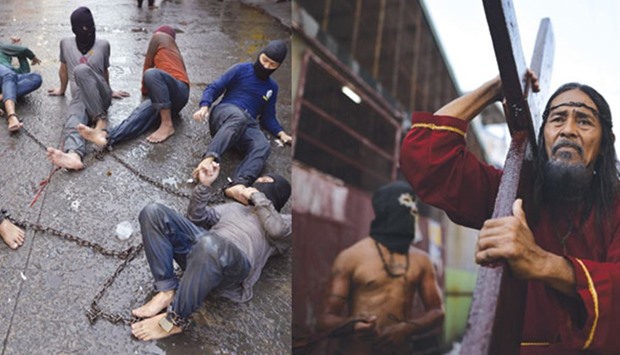More than a dozen penitents were nailed to wooden crosses, while more whipped their backs bloody in Philippine villages yesterday in a gory re-enactment of Jesus Christ’s death.
The rituals, held under the blistering sun in three villages and one city in Pampanga province, about 60 kilometres north of Manila, were a highlight of Easter week celebrations in the predominantly Catholic country.
Thousands of people flocked to the main site of the Good Friday crucifixions in the village of San Pedro Cutud, where seven men were nailed to wooden crosses, according to local officials.
Five penitents were also crucified in the villages of San Juan and Santa Lucia, and three in Angeles City, the officials said.
Dozens of barefoot and hooded men also beat their backs using whips fitted with bamboo sticks, while others carried wooden crosses around their villages or lay on the hot pavement as men flogged their backs.
Wilfredo Salvador, a 59-year-old fisherman who was one of those crucified in San Juan, said it was his 10th time participating in the re-enactment.
“It’s my way of giving thanks to God for helping me,” he said.
In San Pedro Cutud, 56-year-old signpost painter Ruben EGonaje spent 11 minutes nailed on the cross instead of the traditional five minutes.
“I didn’t even notice that it was that long,” he said after.
“Aside from personal prayers and special intentions of other people, I also prayed for peace because I’m worried about what’s happening around the world.”
“I prayed that children, not just in our country, but everywhere else, be spared from suffering,” he said.
Enaje was first crucified in 1986 to give thanks after he was unhurt in a fall from a scaffolding from the third floor of a building, where he was painting the logo of a soft drink company.
The Catholic Church does not encourage the extreme acts of faith, but does little to stop the practice.
“We discourage these acts because they are not necessary,” said Bishop Teodoro Bacani.
“There are more moderate ways of expressing our sorrow for our sins, not in these exaggerated ways.
“But we are not saying that they are bad people for doing this.”
Easter week is a major religious event in the Philippines, where more than 85% of the population is Catholic. Most of the week had been declared public holidays to allow Filipinos to visit their home provinces or take vacations.
Government offices, private companies and commercial establishments are closed.

Penitent Petron Gonzales, 70, a village peacekeeper and in his 25th year portraying Jesus Christ, carries a cross as he takes part in a Good Friday ritual in Pasay city, Metro Manila yesterday. Left: Penitents crawl on the ground with their limbs bound by chains as they take part in a ritual in Pasay city, Metro Manila.
